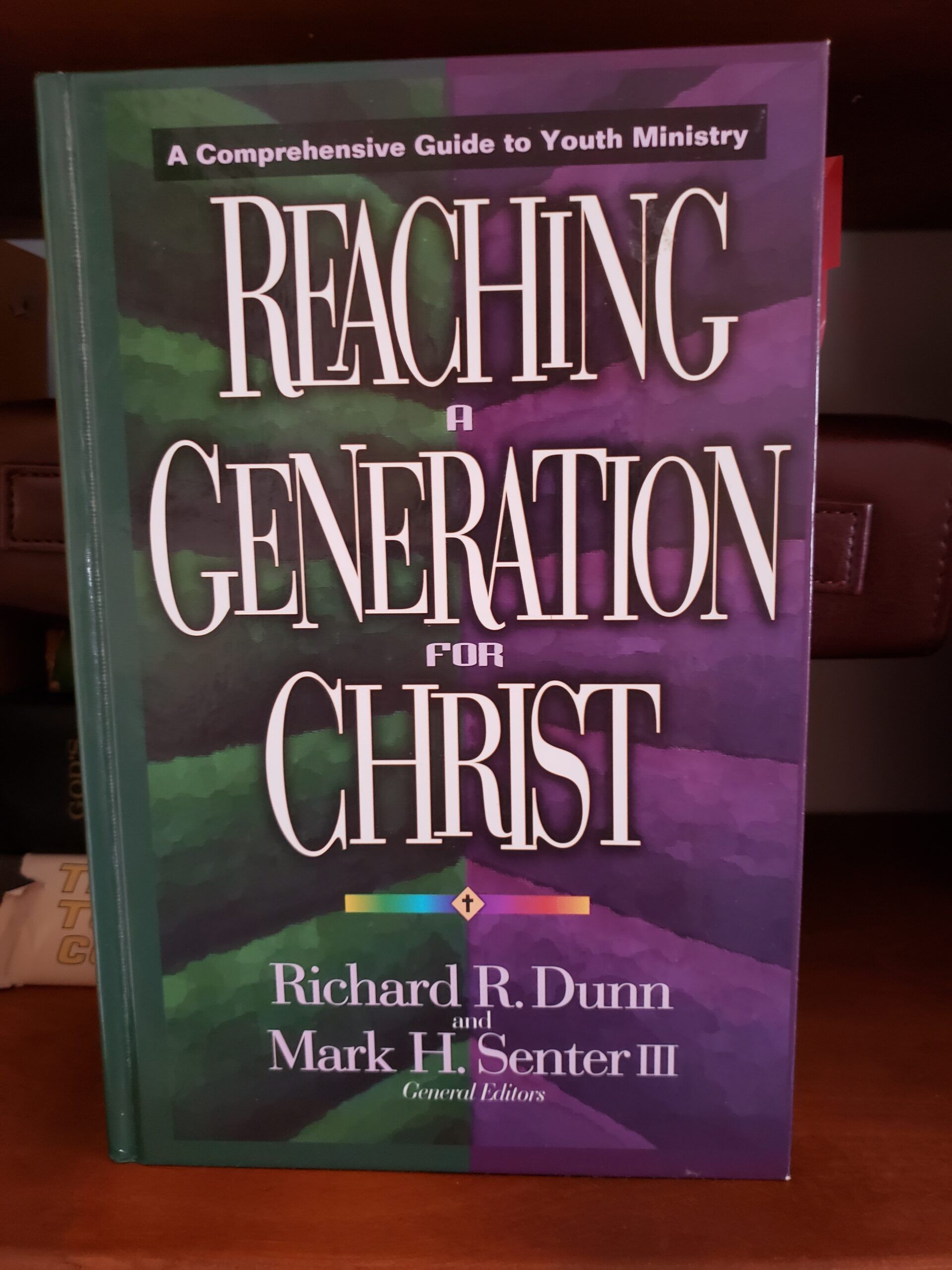
As we continue this series, “Reaching a Generation for Christ,” we look this month at the ideas presented in Chapter 2 of the book Reaching A Generation For Christ, edited by Richard R. Dunn and Mark H. Senter III and published and copyrighted in 1997 by Moody Press. Chapter 2 is written by Richard R. Dunn.
Mr. Dunn begins the second chapter in the book with a story describing the experience of Elizabeth during a typical week as a youth minister, to identify the “heart and soul” of her youth ministry. On Saturday morning, she talks with a student who is “wrestling with spiritual doubt.” Over lunch on Monday, she helps another student who is dealing with a “profound sense of personal inadequacy.” And finally, on Wednesday, she consoles a mother distressed about her daughter’s unplanned pregnancy. This type of schedule leads Dunn to say, “Relationships, human need, and questions about how to find meaning in the midst of life’s circumstances – these are the heart and soul of Elizabeth’s youth Ministry” (p. 45).
MISCONCEPTIONS CONCERNING THEOLOGY
Theology is not often recognized as the primary resource for the challenges faced by the youth minister, says Dunn. Dunn further states, “While most youth ministry texts do provide some biblical basis for their strategies and practices, theology is arguably the least written about aspect of youth ministry” (p.46). He says that there are three misconceptions that cause this to occur: that theology is too big, that it is too impractical and that it is too divisive. He deals with each of these in order, and then concludes, “Theological issues emerge in the living of life and the doing of ministry. Discouraged by the factors just mentioned, leaders may conclude that the best approach is simply to deal with theological concerns as they surface. A preferred response, however, is to pursue theological learning before, during, and after the emergence of critical questions that explicitly demand God’s wisdom. This chapter is designed to encourage youth ministry leaders toward this end by presenting the purpose and impact of intentional theological learning” (p. 47). He calls this the RATIONALE FOR INTENTIONAL THEOLOGICAL LEARNING.
Purpose: Why Pursue Theological Learning?
I have summarized Dunn’s definition of purpose with the following quotations.
1. “The true purpose of theological study is knowing God….
2. “Too often Christians limit their concept of theological learning to the formal, systematic theological studies found in Bible colleges and seminaries….
3. “To balance the picture, it is crucial to recognize that disciplined systematic study of theology is an important component in theological learning….
4. “The discipline of theology – the formal and systematic elements of theological study – is an essential tool in the Christian’s process of coming to a greater, truer personal knowledge of God.”
5. “Rigorous, systematic study is necessary to form and defend orthodox doctrine for the church of Jesus Christ” (pp. 47-49).
Impact: What Differences Does Theology Make?
I have summarized Dunn’s answer to this question with the following quotations.
1. “Impulsively one might be tempted to identify ‘increased accuracy in the teaching of the Scriptures’ as the only substantial ministry result of disciplined theological learning….
2. “The impact of theological learning is not limited, however, to proper hermeneutics and teaching. As we have seen, the depth of one’s personal relationship with God is directly affected by the authenticity of one’s factual knowledge of Him…..
3. “Every believer has a theological perspective – a ‘life lens’ based on his internalized concept of God. In fact every person has a worldview out of which he interprets life” (pp. 49-50).
CONSTRUCTING A THEOLOGICAL FRAMEWORK
According to Mr. Dunn, “A theological framework for doing youth ministry consists of three components: theological foundations, personal implications and ministry applications.” He defines each of the components as follows:
- “Theological foundations are the raw materials necessary for developing a life and ministry that reflect true knowledge of God.”
- “Personal implications address the impact basic theological foundations should have on the life of the leader. Because the leader’s life is the primary teaching tool in ministry, how the leader’s theology shapes her life will be what students learn most about God through her ministry.”
- Ministry applications are principles and practices that directly follow from the theological foundations. The youth ministry leader should seek to make the ‘why’ of youth ministry explicit in the ‘what’ of youth ministry” (pp. 50-51).
With this as a base, Dunn describes six “theological topics” that he says can be used as the “basic building blocks of a theological foundation for youth ministry.”
- Building Block #1:God
- Building Block #2 Scripture
- Building Block #3: Humanity
- Building Block #4: Sin
- Building Block #5: Salvation
- Building Block #6: Faith Community: The Local Church
Regarding the structure of the discussion of these topics, Dunn says, “Immediately following the discussion of each building block are representative personal implications and ministry applications. These brief sections provide examples of how theological foundations shape the life and ministry of a youth ministry leader. The examples by no means exhaust the implications and applications that arise from each topic. Rather, the suggested results of sound theological thinking illustrate the process and product of constructing a disciplined theological framework.” (p. 51)
As I read through each of these building blocks, I found some very encouraging principles that can help me as I work with young people and attempt to influence them to follow Jesus. If I can influence young people, I want them to understand that God is concerned about them, wants them to succeed and will be there for them, even when they turn away from Him. I want them to understand that their first priority is to develop their own personal relationship with God. I want young people to understand and believe that Scripture is the inspired Word of God. That it is His instruction manual on how to live this life to prepare for that eternal life with Him after this physical life is over. It is my desire that young people truly believe that the Bible is very relevant to the issues and decisions that they make in their lives. I want young people to have good self-esteem, understanding that they are made in the image of God. I want to help young people to understand that they sometimes sin because they are human. But I also want to help them understand that when they sin, they can be forgiven by a loving God, when they turn back to him in repentance. I want them to understand the terrible nature of sin – that it separates them from God. And the supreme importance of repentance – that it reconciles them to God. I want them to understand God’s truth about salvation. That it matters not what some man might tell them. What matters is what God tells them. I want them to understand the importance of the faith community – the local church and how important it is for them to be active and working as a member of a local church.
But in spite of the excellent material that I found in this chapter I must agree with another reviewer of this book: “My biggest problem with Reaching a Generation for Christ: A Comprehensive Guide to Youth Ministry from a personal perspective is that anthologies of essays and short stories offer too many convenient spots for setting the book aside and pausing. That’s good when the essays, stories, or fables are deep enough to force one to cogitate upon them for a significant time. For me (and it may just be “for me”), the essays in this book are designed to be so basic that, even when they offer worthy observations, they don’t engender the thought process that would help me put the ideas to work in my situation.” (https://www.goodreads.com/review/show/3093289546?book_show_action=true&from_review_page=1) .
One of my favorite fiction authors is Irene Hannon. I like what she said in a recent interview when asked, “What do you hope readers take away from your books?”
“I have three goals with every book I write. First, I want to entertain. People need wholesome ways to unwind in today’s stressful, fast-paced world, and I do my best to write books that help them put aside their cares for a few hours. Second, I want to leave people with hope; with a belief that no matter how tough life gets, a happy ending is always possible. And finally, I want people to close the last page with a better appreciation for the tremendous power of love—both human and divine—to change lives. To sum up my goal in three words: entertain, enrich, uplift.” (https://www.irenehannon.com/bio.html)
I think maybe that is what we want to accomplish with young people: entertain, enrich, uplift.
In this same interview, when asked, “Any parting words?”
“I’d like to say a few words about Christian fiction. For years it’s had a reputation as being too preachy and heavy-handed in terms of evangelizing. In truth, some of that is deserved. But the genre has changed considerably over the past few years. Now, Christian fiction refers more to books with a certain worldview. As a result, any reader who likes fiction that features traditional values would enjoy many Christian fiction books. I would love to find a way to convince more secular readers to wander into the Christian fiction aisle at their local bookstore. I think many of them would be very pleasantly surprised.” (IBID)
And maybe that is what we are trying to do with young people; convince the secular student to wander into the Christian sphere and experience a taste of traditional values that would impact their worldview and bring them more lasting joy and happiness than maybe what they have experienced thus far.
Those are my thoughts on youth ministry for this month. As this year winds down, and you set your sights on a new year, won’t you take time to pray that we all do our part in Reaching a Generation for Christ? Thanks for reading dear friends …
–Randy

